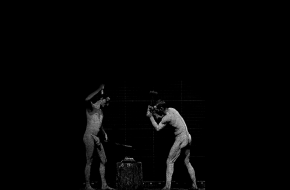My mother’s blue sky
Amir is 8. He has lost his father and lives with his mother on a hill away from
the village. They earn their living thanks to a small mine which makes them
independent. The owner of a large mine nearby tries to take over the smaller
companies. When Amir’s mother dies, the village council decides to move the
boy back to the village and take the mine away from him. However, true to his
mother’s wish, Amir opposes their decision.
the village. They earn their living thanks to a small mine which makes them
independent. The owner of a large mine nearby tries to take over the smaller
companies. When Amir’s mother dies, the village council decides to move the
boy back to the village and take the mine away from him. However, true to his
mother’s wish, Amir opposes their decision.

My Nikifor
The account of friendship between Marian Włosiński, a graduate from the
Academy of Fine Arts in Krakow and a visual artist of the Spa Houses in
Krynica, and the disabled illiterate painter. Based on a true story from
the life of Epifan Drowniak, a genius primitivist painter known as
Nikifor Krynicki. On 15th April 1960, he entered Włosiński’s studio and said: I will paint here!
He just popped in but stayed for the rest of his life. The action of
the film depicts three months of 1960, two days of 1967 when a large
gallery of Nikofor’s works was open in Zachęta and one day of 1968 – the
day he died. It’s the film about the spiritual life of an artist who
creates most excellent works thanks to his spiritual freedom.
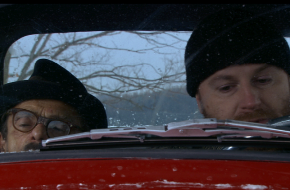
Neon
The history of Warsaw neon lights from the pre-war period until today. The historical and political context of the “neonisation” of the capital in the times of real socialism and the fate of the neon lights after 1989. Poland’s 20th-century turbulent past and the story of neon lights reflecting the mental transformation happening in the country.
When Poland regained its independence after WWI, the first neon lights appeared in Warsaw. After 123 years of partitions they were a sparkle of hope and a symbol of the returning glamour. Destroyed during WWII, paradoxically, they came back during the times of real socialism: in a system opposing the capitalist philosophy of the West, neon lights were extraordinary advertisements. The Warsaw neons lights were put out during the martial law. Most of them have never returned to their former glory.
When Poland regained its independence after WWI, the first neon lights appeared in Warsaw. After 123 years of partitions they were a sparkle of hope and a symbol of the returning glamour. Destroyed during WWII, paradoxically, they came back during the times of real socialism: in a system opposing the capitalist philosophy of the West, neon lights were extraordinary advertisements. The Warsaw neons lights were put out during the martial law. Most of them have never returned to their former glory.

New World
A story of three young immigrants who are trying to find their place in a
better world... in Poland. After she abandons her husband, a Belarusian
member of the opposition, Żanna lives with her daughter at her sister’s
in Warsaw. She wants to move out as soon as possible and build a normal
home with her boyfriend. Her plans get complicated once her husband is
arrested again.
An Afghan, Azzam, who works for the Polish army as an interpreter is seen as a traitor in his homeland. After he is evacuated to Poland he can’t recover from his war experiences. Will he find a place for himself in a world where he will always be a stranger?
A Ukrainian, Wera, flees to Poland to undergo a sex change surgery in secret from her family. An unexpected visit from her father and her little son makes her consider the question of her own identity yet again.
An Afghan, Azzam, who works for the Polish army as an interpreter is seen as a traitor in his homeland. After he is evacuated to Poland he can’t recover from his war experiences. Will he find a place for himself in a world where he will always be a stranger?
A Ukrainian, Wera, flees to Poland to undergo a sex change surgery in secret from her family. An unexpected visit from her father and her little son makes her consider the question of her own identity yet again.

Nightmares
The coming-of-age story of Mikołaj Srebrny, a confrontation between an
intelligent, sensitive boy and an authoritarian school persecuting
independent thinking, the hypocrisy and cruelty of adults. And although
consecutive initiations – including that into eroticism – sometimes
prove difficult, the protagonist emerges from his life trials unscathed.
Wojciech Marczewski’s cinema debut, honoured with the Andrzej Munk Award. An adaptation of a formerly scandalous novel by Emil Zegadłowicz with a strong autobiographical overtone. The director’s first story about childhood and its initiations, with a crucial question recurring in his later films: how to save yourself and find your place in the world.
Wojciech Marczewski’s cinema debut, honoured with the Andrzej Munk Award. An adaptation of a formerly scandalous novel by Emil Zegadłowicz with a strong autobiographical overtone. The director’s first story about childhood and its initiations, with a crucial question recurring in his later films: how to save yourself and find your place in the world.
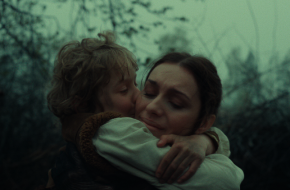
Noodles the Gate
A story about how egoism never pays and how using somebody’s work to satisfy your own whims will be punished...
A long, long time ago or maybe not so long ago... in a land far far away or maybe somewhere close... in an alley in Wrocław there lived a Handyman who loved the traditional Silesian noodles above all else in the world. Every morning the smell of noodles cooked by his wife was filling the whole alley, until one day it reached the Mayor...
A long, long time ago or maybe not so long ago... in a land far far away or maybe somewhere close... in an alley in Wrocław there lived a Handyman who loved the traditional Silesian noodles above all else in the world. Every morning the smell of noodles cooked by his wife was filling the whole alley, until one day it reached the Mayor...
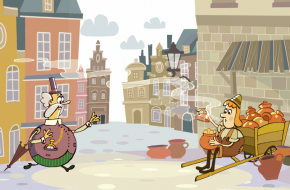
O-bi, O-ba: The end od civilization
One year after the end of a nuclear war the few survivors live in terrible conditions underneath a concrete dome, which protects them from the harmful radiation, but not from famine, diseases and the gradual loss of humanity. The only thing that keeps them alive is the rumour about an Ark that will come and collect them one day. Soft, “the persuasion specialist”, a member of the ruling junta knows that the Ark is a lie created by the rulers, and yet, he himself will be willing to believe it…
The II part of Szulkin’s tetralogy refers to the traditions of dystopia. The pessimistic vision of the future as interpreted as an allegory of Poland under the martial law but also more universally, in existential terms.
The II part of Szulkin’s tetralogy refers to the traditions of dystopia. The pessimistic vision of the future as interpreted as an allegory of Poland under the martial law but also more universally, in existential terms.
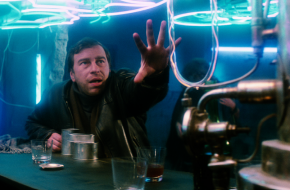
Once Upon a Time
The author uses photos by Eadweard Muybridge who photographed movement phases. Fragmented action is revived and intertwined with dozens of repetitive, sequential activities.
